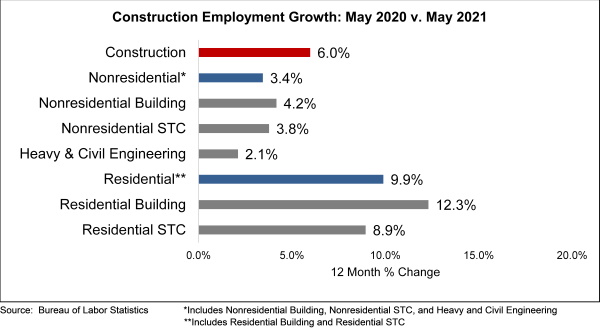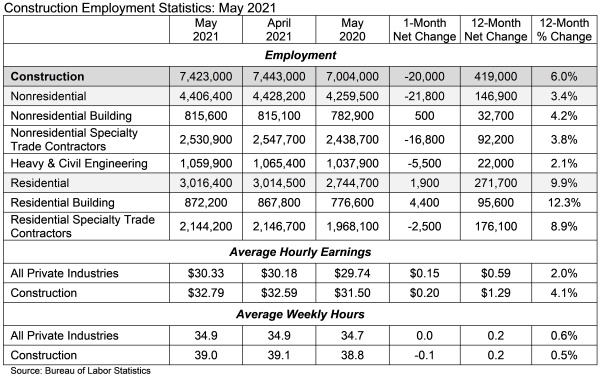WASHINGTON, June 4—The construction industry lost 20,000 jobs on net in May, according to an Associated Builders and Contractors analysis of data released today by the U.S. Bureau of Labor Statistics. Overall, the industry has recovered 888,000 (79.8%) of the jobs lost during earlier stages of the pandemic.
Nonresidential construction employment declined by 21,800 positions on net, with the majority of losses sustained among nonresidential specialty trade contractors, a segment that lost 16,800 jobs. Heavy and civil engineering lost 5,500 jobs, while nonresidential building added 500 jobs on net.
The construction unemployment rate fell to 6.7% in May. Unemployment across all industries declined from 6.1% in April to 5.8% last month.
“The issue is not demand for workers, it is supply,” said ABC Chief Economist Anirban Basu. “The number of available, unfilled jobs openings in construction has been rising rapidly in recent months, but employment gains proved elusive in May. This is hardly unique to construction. Despite a record number of available, unfilled jobs in America, the labor force participation rate actually dipped in May to 61.6%. Coming into the pandemic, that level was 63.3%. In percentage terms, this doesn’t appear especially revolutionary, but it translates into millions of Americans who are no longer working and who are not presently seeking employment.
“Constraints on hiring are pushing wages higher,” said Basu. “This comes on top of materials price increases experienced in recent months. Remarkably, despite inflationary pressures, the ongoing wait for a meaningful federal infrastructure package and compromised commercial real estate fundamentals, most nonresidential contractors remain positive regarding their prospects over the balance of the year. ABC’s Construction Confidence Index indicates that contractors expect sales, employment and profit margins to rise over the next six months. Backlog remains steady.
“There are several possible reasons why many Americans remain reluctant to re-engage in the labor market,” said Basu. “Among the challenges are stepped-up unemployment insurance benefits, children still learning remotely and lingering fears of infection and/or vaccination and prior stimulus payments. A number of governors have seen fit to truncate the duration of supplemental federal unemployment insurance benefits. At least theoretically, this should result in more significant labor force participation going forward. But it is conceivable that the pace of job gains will remain somewhat disappointing over the summer from a national perspective since governors in many populous states have not moved in that direction.”

Visit abc.org/economics for the Construction Backlog Indicator and Construction Confidence Index, plus analysis of spending, employment, GDP and the Producer Price Index.
Associated Builders and Contractors is a national construction industry trade association established in 1950 that represents more than 21,000 members. Founded on the merit shop philosophy, ABC and its 69 chapters help members develop people, win work and deliver that work safely, ethically and profitably for the betterment of the communities in which ABC and its members work. Visit abc.org.







